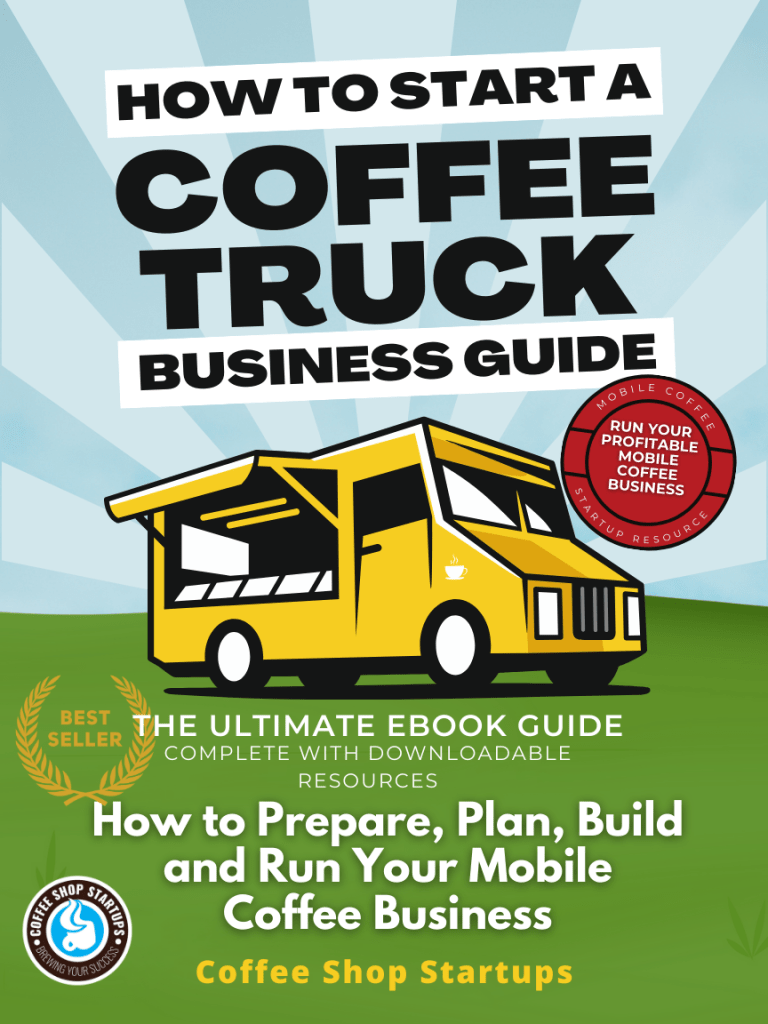Start a Coffee Truck in North Carolina
How to Start a Coffee Truck Business in North Carolina
 There are many great reasons to start a coffee truck business in North Carolina.
There are many great reasons to start a coffee truck business in North Carolina.
The growing trend for street vending in cities and towns everywhere, including North Carolina, makes it appealing for coffee entrepreneurs to consider opening a mobile coffee business.
Additionally, local and state leaders in North Carolina are rediscovering the need to re-invigorate public spaces, parks, downtown metro areas, and streets to pedestrian traffic.
Coffee trucks and coffee trailers make an excellent addition to many cities' overall goals to spur local business activity, safety, and commerce. And they will be great in North Carolina.
In this post, we'll talk about how to start your coffee truck in North Carolina. For a more in-depth discussion, read our post, How to Start a Coffee Truck Business.
Further Reading: Do Coffee Trailers Make Money?
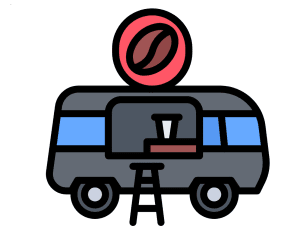
Mobile Coffee Business in North Carolina
How Much Does It Cost To Start a Coffee Truck in North Carolina
 The costs of starting a coffee truck in North Carolina depend on several factors that can add up quickly.
The costs of starting a coffee truck in North Carolina depend on several factors that can add up quickly.
For example, the cost of the coffee truck or coffee trailer structure itself, building it out (remodeling) to serve coffee, and the contract labor, marketing, power, and installing equipment costs – all depend on how big you want to go.
Costs include:
- Coffee truck or trailer
- Building it out
- Coffee equipment
- Labor costs
- Marketing
- Inventory
Because of all these factors, you can easily have a wide spectrum of startup costs.
As you probably know, everything adds up. However, you can estimate that a typical coffee truck can cost anywhere from $15,000 to $100,000. From our observations, the average used coffee truck (no equipment) is often skewed slightly towards the $35,000-$60,000 range.
Available Now:
Get the Mobile Coffee Business E-book:
![]()
How to Start a Coffee Truck
Steps to Starting a Coffee Truck in North Carolina
Below is a list of key steps you will want to take to start your coffee truck business. Consider each of them as you set out to plan and launch your mobile coffee business.
1. Decide on a Coffee Truck Concept.
There are a variety of mobile coffee concepts to choose from. Take time to discover what your options are. Start by visiting a few existing coffee trucks or trailers in your area. Even if you already have an idea, a real-world visit can help you determine what direction you would like to move towards.
Your concept is essentially the practical representation of your vision. In essence, it is recommended that you properly develop your mobile coffee vision before moving forward.
2. Assess Your Resources to Fund Your Mobile Coffee Truck.
Your coffee truck will require startup funds. Ultimately, how much money your coffee truck will cost will depend on the concept you have decided to pursue.
Consider exactly how much money you will have access to acquire your coffee truck and build it out. This coffee startup funding mix may be from your savings, a business account, investments, etc.
If you have some money set aside for your coffee truck business but may need to borrow the rest (investors or loans), you will want to know approximately how much you'll need.
As you develop your plan and budget, you will want to determine how you will fund your mobile coffee business. First, consider all of your financial resources. Those resources are solidly in your possession, as well as other resources that you may have to borrow from.
3. Consider Who Your Customers Are (Or Will Be).
North Carolina is a vibrant state with different people with different interests and tastes.
When starting any coffee business, you want to stay focused on your customers throughout your entire process. For mobile coffee businesses, staying laser-focused on your target customers will be your biggest goal.
- Who do you imagine serving your coffee to?
- Will you work at private events, ticketed festivals, community farmers markets, or other special dates like weddings and anniversary parties?
- Will you be serving tourists or locals?
- Or any combination of these?
The North Carolina customers you plan to serve will have a significant impact on your menu. Likewise, your coffee menu will impact your need for coffee equipment. In turn, your coffee equipment will determine your need for physical space, and so on.
Indeed, your coffee business costs are never really independent of one another. They are all connected. Knowing who your ideal customer is will help you make some pretty important decisions.

Get The Ultimate Mobile Coffee Business E-book
4. Your Coffee Truck Budget.
Now that you know your concept and customers, it's time to focus on your budget. The amount of money you have to put towards your coffee shop will either determine your coffee shop concept or alter it in some fundamental way.
Business concepts are all wonderful until they quickly hit the wall of financial constraints.
So, remember your entire coffee truck budget from the beginning because it will ultimately dictate how far you will go. Thinking and assuming that “The money will come to me somehow” may not be the best approach.
5. Your Coffee Truck Equipment.
Once you've determined your concept, your target customer, your budget, and your coffee truck menu, you will be able to focus on your coffee equipment.
Your coffee equipment is the bread and butter of your mobile coffee business. Without it, you will be hard-pressed to provide coffee to your customers.
6. Your Coffee Truck Power Needs.
When you are in a coffee truck or coffee trailer, you'll have to figure out how you will power your coffee operation. Indeed, it will take power to run your equipment. Will you use an extension cord and power up to an available power outlet? Will you hook up to a generator instead?
The power and wattage you'll need are essential considerations for any mobile coffee business. Each piece of equipment will draw power. Hopefully, you'll know what kind of power you'll require before building out your coffee bar and buying your coffee equipment.
7. Your Coffee Truck Business Plan.
Having a well-written mobile coffee business plan will make life easier for you as you move forward with your mobile coffee business. Now that you have the information from our tips above, you should be ready to write your coffee business plan down.
Your investment in time and effort to write your business plan will certainly pay off – likely saving you money, time, and future headaches.
8. Coffee Truck Health Department Regulations.
North Carolina will have health code regulations you need to abide by. Knowing the requirements mandated by your local health department is something you need to determine long before you decide which coffee truck to buy and certainly before you build it out.
Our strong recommendation is that before you buy your new or used coffee truck, you should also review the regulations of your local health department in the jurisdiction you plan to do business in. Unfortunately, it's quite common to invest a lot of money in your setup only to have it unable to pass inspection.
9. Get Your Mobile Coffee Truck.
Getting your mobile coffee truck is the exciting part! Now that you have written your plan develop your budget and consider your funding. Then, it's time to procure your coffee truck.
You have a few options to set up your coffee truck for your business. You can either refurbish or retrofit an existing truck, or you can buy a coffee truck or coffee trailer.
There are plenty of options to find used trucks on sites like Craigslist, where you can buy a used truck. There are also food truck manufacturers that can produce a coffee truck to your specifications.
10. Get Barista Training.
Serving great coffee to your customers is a must. If you have not been a barista, it might be helpful to get barista training. Most likely, you will be the primary person serving coffee. That is, until you hire someone. In this case, your responsibility for training your employees will be an essential part of your job.
Even if you have had experience as a barista, refreshing your barista skills will improve your overall coffee business. It will enhance customer experience, as well as eliminate waste. If you decide to hire baristas, one of your main jobs as a coffee shop business owner is to hire amazing baristas. They will ultimately be the face of your business and will either drive or hurt sales.
Open a Mobile Coffee Business in North Carolina
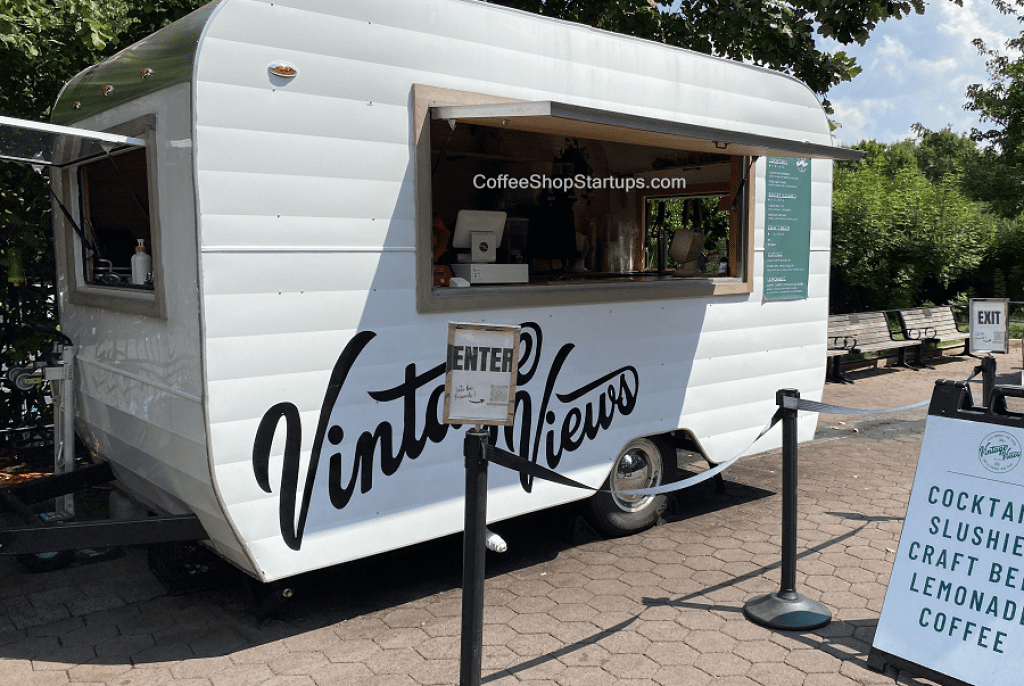
11. Your Coffee Truck Marketing Plan.
Coffee can be a competitive business. You need to stand out. So, as you start your coffee truck business, you'll want to have a marketing plan to help generate buzz.
The basics of a marketing plan require you to develop a brand, logo, and position in your niche. You want to support your brand with a coffee business website, cards, and social media accounts. Face-to-face networking and community outreach are also important.
Further Reading: Steps to Open Your Coffee Shop
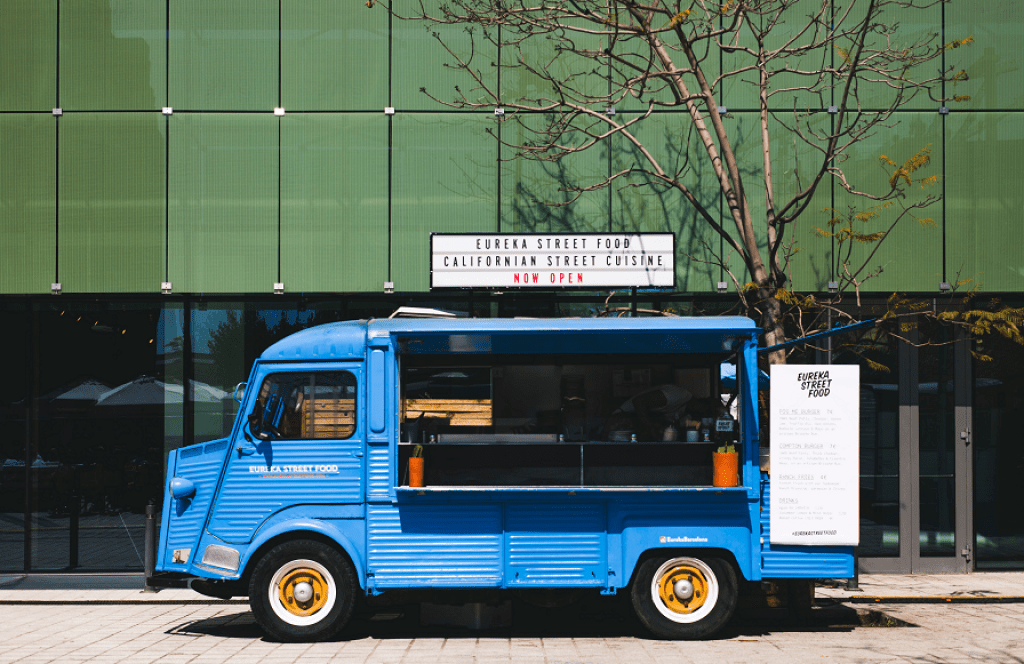
How to Start a Coffee Truck in North Carolina
Coffee Truck Requirements and Permits Needed
Before your mobile coffee business can serve any coffee in Nevada, you must get a permit through local or county agencies.
Depending on your location, this process could be more cumbersome in some locations.
For starters, I would recommend working with agencies in the locale you are planning to do business in – and not necessarily the city where you live (unless, of course, you are also planning to do business there).
If you plan on working in several cities or counties, you should decide where exactly you will be early on in planning your coffee truck business. Once you determine where you operate your mobile coffee business, you'll need to determine all the requirements you'll need to satisfy before you are issued a permit.
Establish Your Coffee Truck Business in North Carolina
You’ll want to set up your coffee truck or coffee trailer business as a legal entity in your state. This is usually done through the North Carolina Secretary of State's office. While you will have several options, it's our observation that many coffee businesses appreciate the benefits of establishing an LLC.
![]()
Start a Coffee Truck in North Carolina
North Carolina State Business Links
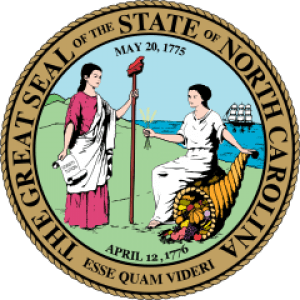 Setup Your Business Structure in North Carolina
Setup Your Business Structure in North Carolina
North Carolina Business Formation
Register Your Business in North Carolina
Register your North Carolina Business
North Carolina Food Handler’s Card
North Carolina Food Handler's Card (Website Currently Down)
Food Truck Association of North Carolina
FB North Carolina Food Truck Association
Further Reading: How to Start a Coffee Shop in North Carolina
Best Locations to Operate a Coffee Truck in North Carolina
North Carolina’s blend of thriving cities, college towns, coastal tourism, and mountain adventures makes it a fantastic state to launch a mobile coffee business. Here are some of the top places to set up your coffee truck:
- Urban Business Districts – Cities like Charlotte, Raleigh, Durham, and Greensboro have vibrant downtown areas filled with professionals looking for fast, high-quality coffee.
- University Campuses – Target schools like the University of North Carolina (UNC) at Chapel Hill, Duke University, NC State (Raleigh), and Appalachian State University (Boone). These campuses offer a daily crowd of coffee-loving students, faculty, and staff.
- Commuter Hubs & Transit Centers – Set up near light rail stops (Charlotte’s LYNX Blue Line), park-and-ride lots, and bus terminals to serve busy commuters.
- Tourist Attractions & Coastal Areas – Popular tourist destinations like Asheville, Wilmington, the Outer Banks, and Blue Ridge Parkway bring in travelers who enjoy craft and local coffee options.
- Farmers Markets & Local Events – Events like the Durham Farmers Market, Charlotte Regional Farmers Market, and Raleigh’s Artsplosure Festival offer high-foot-traffic vending opportunities.
- Sporting Events & Stadiums – Game days at Bank of America Stadium (Carolina Panthers), PNC Arena (Hurricanes), and college stadiums like Kenan Memorial Stadium (UNC) offer massive sales potential.
- Outdoor Recreation Areas – Locations near the Great Smoky Mountains National Park, Pisgah National Forest, and the Blue Ridge Mountains attract hikers, campers, and outdoor adventurers who love starting their day with a fresh brew.
- Beach Towns & Boardwalks – During spring and summer, set up in Carolina Beach, Wrightsville Beach, and Emerald Isle to serve tourists, early risers, and beachgoers.
Since North Carolina vending rules vary by city and county, check with local health departments and zoning offices for permit and location requirements before operating.
Seasonal Considerations for Running a Coffee Truck in North Carolina
North Carolina has hot, humid summers, mild winters, and year-round tourism, making seasonal flexibility important for your coffee truck's success.
- Winter (December–February)
- Hot drinks dominate during the cooler months, especially in the mountain regions. Offer lattes, mochas, spiced chai, and hot chocolate.
- Set up near ski resorts (like Beech Mountain and Sugar Mountain), college campuses, and downtown areas with winter events and holiday shopping.
- Feature seasonal flavors like peppermint mocha, cinnamon maple, and gingerbread lattes.
- Spring (March–May)
- The weather starts warming up, making iced drinks and light roasts more popular.
- Farmers markets and spring festivals like the NC Azalea Festival (Wilmington) or Dogwood Festival (Fayetteville) are great vending opportunities.
- Introduce flavors like honey lavender, vanilla bean cold brew, and citrus teas.
- Summer (June–August)
- Hot and humid conditions call for cold brew, iced lattes, nitro coffee, and refreshing tea blends.
- Set up near beaches, lakes, hiking trails, and summer music festivals like Hopscotch Music Festival (Raleigh).
- Offer options like caramel iced lattes, fruity teas, or dairy-free and plant-based alternatives.
- Fall (September–November)
- Pumpkin spice, apple cinnamon, and maple cold brew dominate fall flavor trends.
- Target fall festivals, apple orchards (like in Hendersonville), tailgate events (especially college football games), and leaf-peeping hotspots in the mountains.
- Vending at Halloween events, art fairs, and Thanksgiving markets can give your sales a seasonal boost.
By adjusting your menu, locations, and event calendar to align with North Carolina’s climate and cultural rhythm, your coffee truck can thrive in every season.
Other CSSU Articles:

Start A Coffee Truck in North Carolina
Steps to Start a Coffee Truck Business
- First, Decide on a Coffee Truck Concept.
- Next, assess your current financial resources.
- Consider who your customers are.
- Develop your budget around your coffee truck concept.
- Consider which coffee trailer equipment you will need.
- Consider your power needs.
- Write your mobile coffee business plan.
- Understand local health department regulations.
- Get your mobile coffee truck.
- Get barista training.
- Develop your mobile marketing plan.
Mobile Coffee Business Coaching
Starting a coffee truck is a great option for many would-be coffee entrepreneurs. Yet, starting a coffee truck requires you to consider several important factors before spending significant money.
We offer you an affordable mobile coffee consulting service that can help get your coffee truck off the ground. To get a consultation, contact us at contact@coffeeshopstartups.com.

Buy the Ultimate Coffee Trailer Ebook
Delivered Instantly

